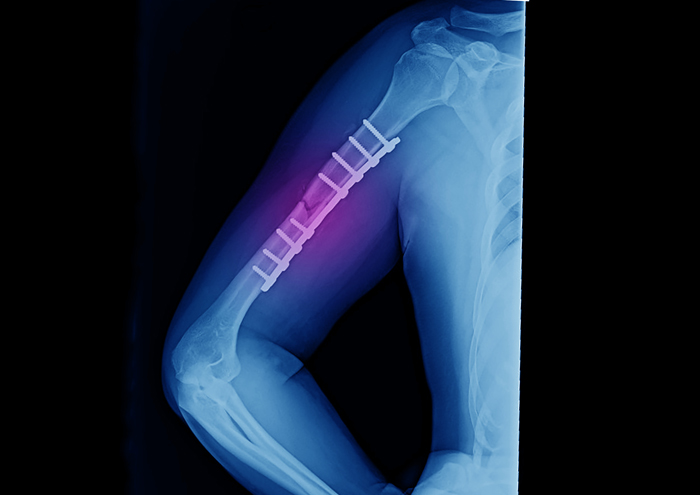Open Reduction Internal Fixation Treatment & Diagnostics in Karol Bagh, Delhi
Open Reduction Internal Fixation (ORIF)
What is Open Reduction Internal Fixation (ORIF)?
Open Reduction Internal Fixation or ORIF is a surgical procedure to reposition and fix severely broken bones.
What should you know about Open Reduction Internal Fixation?
The standard approach of using casts or splints may not heal bone fractures that involve breaking of bones in multiple pieces. Open Reduction Internal Fixation surgery at any reputed orthopedic hospital in New Delhi enables doctors to realign the bones with open surgery. ORIF is also a suitable procedure for fractures that involve joints. These fractures result in unstable joints with displacement of bones.
Open Reduction Internal Fixation (ORIF) combines two procedures:
- Open Reduction - During Open Reduction, a surgeon realigns a bone by making an incision.
- Internal Fixation - The use of hardware holds the bones together during Internal Fixation.
- The hardware for Internal Fixation may comprise screws, pins, metal plates and rods. The hardware may stay even after the bone has healed.

Who qualifies for Open Reduction Internal Fixation?
Ideal candidates for Open Reduction Internal Fixation are individuals with severe fractures in the ankle, hip, knees, wrists, elbows, arms and legs. Open Reduction Internal Fixation is suitable for bone fractures that involve:
- Breaking of bones into multiple fragments
- Displacement of bones from the original positions
- A bone has come out of the skin
Your orthopedic specialist in Karol Bagh will determine the urgency of Open Reduction Internal Fixation surgery by considering the risks and complications of bone injuries. Open Reduction Internal Fixation may be necessary for realigning bones if the healing is not proper after the previous procedure of closed reduction.
Visit a hospital to consult a doctor for planning Open Reduction Internal Fixation surgery.
Request an appointment at Apollo Spectra Hospitals, Karol Bagh, New Delhi.
Call 1860 500 2244 to book an appointment.
Why is Open Reduction Internal Fixation performed?
Orthopedic doctors from the best orthopedic hospitals in New Delhi use ORIF to reposition pieces of bones and fix them with orthopedic implants:
- Plates - Plates help to fix two pieces of bones together. The doctor uses special screws to attach these plates to bones.
- Wires - Wires may be necessary for pinning the bones together. Wires allow holding the fragments of bones together and are suitable for minor fractures of bones.
- Nails and rods - Doctors insert rods into the hollow bone cavities to fix two portions of long bones. These rods have screws at both ends to prevent the rotation of bones. The rods are helpful to treat fractures in the shinbone and thighbone.
What are the benefits?
ORIF is necessary if multiple fractures are very severe or joint injury is causing a loss of stability. The standard approach of using casts and splints may not repair these conditions. Internal Fixation reduces hospital stay and enables patients to resume daily activities in a short time.
Doctors use orthopedic implants of chrome, cobalt, titanium or stainless steel. These implants can remain inside the body for several years with no issues. The implant material is compatible with the body and does not cause any allergic reactions.
Open Reduction Internal Fixation reduces the possibility of improper healing or healing of bone fractures in an inappropriate position. Consult the best orthopedic surgeon in New Delhi for an assessment and to know the advantages of ORIF.
Request an appointment at Apollo Spectra Hospitals, Karol Bagh, New Delhi.
Call 1860 500 2244 to book an appointment.
What are the risks?
ORIF carries all risks and complications of any surgery like bleeding, need for blood transfusion, infection and side effects of anesthesia. Following are some risks of ORIF:
- Compartment syndrome that results in tissue or muscle damage because of a rise in pressure
- Pain
- Swelling
- Displacement of hardware
- Loosening of hardware
- Damage to tendon or ligaments
- Loss of mobility
- Persistent pain because of hardware
- Popping or snapping noise
- Incomplete healing
- Muscular spasms
- Blood clots
Contact an orthopedic specialist in Karol Bagh if you notice signs of infection like fever, severe pain, swelling and fluid discharge.
Avoid putting any weight or pressure on the site of the surgical procedure. Using support such as a sling, wheelchair and crutches will help you maintain balance to prevent further injuries. These will also help you recover faster. It may be several weeks before you can undertake regular activities. Follow instructions of your orthopedic doctor in New Delhi regarding medication and other wound care tips.
Call your doctor if you notice severe swelling and pain or if your fingers are turning blue or cold. The presence of high fever shows infection. Contact your doctor if you are running a high fever.
It may take between three to 12 months for complete recovery after ORIF surgery. The recovery period depends upon the extent of the injury and the site of surgery.
Our Top Specialities
NOTICE BOARD
CONTACT US
CONTACT US
 Book Appointment
Book Appointment


.svg)
.svg)
.svg)
.svg)








